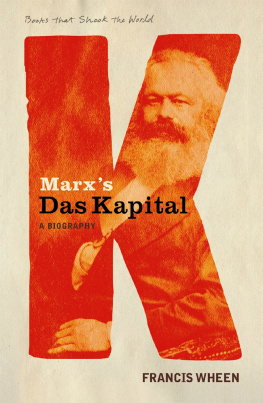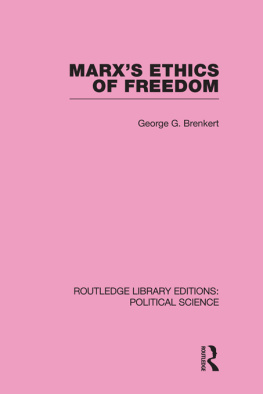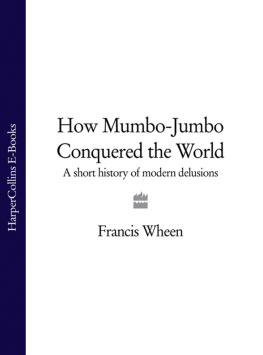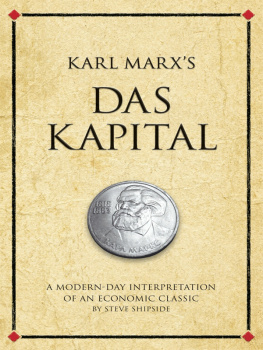Wheen Francis - Marxs Das Kapital
Here you can read online Wheen Francis - Marxs Das Kapital full text of the book (entire story) in english for free. Download pdf and epub, get meaning, cover and reviews about this ebook. publisher: Atlantic Books, genre: Detective and thriller. Description of the work, (preface) as well as reviews are available. Best literature library LitArk.com created for fans of good reading and offers a wide selection of genres:
Romance novel
Science fiction
Adventure
Detective
Science
History
Home and family
Prose
Art
Politics
Computer
Non-fiction
Religion
Business
Children
Humor
Choose a favorite category and find really read worthwhile books. Enjoy immersion in the world of imagination, feel the emotions of the characters or learn something new for yourself, make an fascinating discovery.
- Book:Marxs Das Kapital
- Author:
- Publisher:Atlantic Books
- Genre:
- Rating:5 / 5
- Favourites:Add to favourites
- Your mark:
- 100
- 1
- 2
- 3
- 4
- 5
Marxs Das Kapital: summary, description and annotation
We offer to read an annotation, description, summary or preface (depends on what the author of the book "Marxs Das Kapital" wrote himself). If you haven't found the necessary information about the book — write in the comments, we will try to find it.
Marxs Das Kapital — read online for free the complete book (whole text) full work
Below is the text of the book, divided by pages. System saving the place of the last page read, allows you to conveniently read the book "Marxs Das Kapital" online for free, without having to search again every time where you left off. Put a bookmark, and you can go to the page where you finished reading at any time.
Font size:
Interval:
Bookmark:

Marxs Das Kapital
A Biography
Francis Wheen is the author of The Soul of Indiscretion, a life of Tom Driberg; Karl Marx; The Irresistible Con; Hoo Hahs and Passing Frenzies, which won the Orwell Prize in 2003; and the best-selling How Mumbo Jumbo Conquered the World: A Short History of Modern Delusions.
Other titles in the Books That Shook the World series:
Available now:
Platos Republic by Simon Blackburn
Darwins Origin of Species by Janet Browne
Thomas Paines Rights of Man by Christopher Hitchens
The Quran by Bruce Lawrence
Adam Smiths On the Wealth of Nations by P. J. ORourke
Forthcoming:
The Bible by Karen Armstrong
Machiavellis The Prince by Philip Bobbitt
Homers The Iliad and the Odyssey by Alberto Manguel
Carl von Clausewitzs On War by Hew Strachan

First published in Great Britain in hardback in 2006 by Atlantic Books, an imprint of Grove Atlantic.
This paperback edition published in Great Britain in 2007 by Atlantic Books.
Copyright Francis Wheen 2006
The moral right of Francis Wheen to be identified as the author of this work has been asserted in accordance with the Copyright, Designs and Patents Act of 1988.
All rights reserved. No part of this publication may be reproduced, stored in a retrieval system, or transmitted in any form or by any means, electronic, mechanical, photocopying, recording, or otherwise, without the prior permission of both the copyright owner and the above publisher of this book.
9 8 7 6 5 4 3 2 1
A CIP catalogue record for this book is available from the British Library.
ISBN 978 1 84354 401 2
eISBN 978 1 78239 216 3
Designed by Richard Marston
Typeset by Avon DataSet Ltd, Bidford on Avon, Warwickshire B50 4JH
Printed in Great Britain
Atlantic Books
An imprint of Grove Atlantic Ltd
Ormond House
2627 Boswell Street
London WC1N 3JZ
www.groveatlantic.co.uk
CONTENTS

A NOTE ON TRANSLATIONS

If you wish to read Marxs masterpiece for yourself, the least intimidating option is Capital: A New Abridgement, edited by David McLellan (OUP Worlds Classics), a one-volume collection of the most important chapters. Its extracts from Volume I are in the original English translation of 1887; the translations from Volume II are by McLellan himself; the material for Volume III comes from the anonymous Moscow translation published in 1971.
If you want to plunge straight into a full, unabridged version, I recommend the Penguin Classics edition in three volumes, translated by Ben Fowkes and with an introduction (which you may decide to skip) by Ernest Mandel.
Since no single translation is perfect, I have used various sources for the passages from Das Kapital cited in this book. Some of the quotations are from the Penguin text, some from the Worlds Classics, some from the Marx & Engels Collected Works (50 vols, Lawrence & Wishart) and some are my own.
INTRODUCTION

The Unknown Masterpiece
In February 1867, shortly before delivering the first volume of Das Kapital to the printers, Karl Marx urged Friedrich Engels to read The Unknown Masterpiece by Honor de Balzac. The story was itself a little masterpiece, he said, full of the most delightful irony.
We dont know whether Engels heeded the advice. If he did, he would certainly have spotted the irony but might have been surprised that his old friend could take any delight in it. The Unknown Masterpiece is the tale of Frenhofer, a great painter who spends ten years working and reworking a portrait which will revolutionize art by providing the most complete representation of reality. When at last his fellow artists Poussin and Porbus are allowed to inspect the finished canvas, they are horrified to see a blizzard of random forms and colours piled one upon another in confusion. Ah! Frenhofer cries, misinterpreting their wide-eyed amazement. You did not anticipate such perfection! But then he overhears Poussin telling Porbus that eventually Frenhofer must discover the truth the portrait has been overpainted so many times that nothing remains.
Nothing on my canvas! exclaimed Frenhofer, glancing alternately at the two painters and his picture.
What have you done? said Porbus in an undertone to Poussin.
The old man seized the young mans arm roughly, and said to him: You see nothing there, clown! varlet! miscreant! hound! Why, what brought you here, then? My good Porbus, he continued, turning to the older painter, can it be that you, you too, are mocking at me? Answer me! I am your friend; tell me, have I spoiled my picture?
Porbus hesitated, he dared not speak; but the anxiety depicted on the old mans white face was so heart-rending that he pointed to the canvas saying: Look!
Frenhofer gazed at his picture for a moment and staggered.
Nothing! Nothing! And I have worked ten years!
He fell upon a chair and wept.
After banishing the two men from his studio, Frenhofer burns all his paintings and kills himself.
According to Marxs son-in-law Paul Lafargue, Balzacs tale made a great impression on him because it was in part a description of his own feelings. Marx had toiled for many years on his own unseen masterpiece, and throughout this long gestation his customary reply to those who asked for a glimpse of the work-in-progress was identical to that of Frenhofer: No, no! I have still to put some finishing touches to it. Yesterday, towards evening, I thought that it was doneThis morning, by daylight, I realized my error. As early as 1846, when the book was already overdue, Marx wrote to his German publisher: I shall not have it published without revising it yet again, both as regards matter and style. It goes without saying that a writer who works continuously cannot, at the end of six months, publish word for word what he wrote six months earlier. Twelve years later, still no nearer completion, he explained that the thing is proceeding very slowly because no sooner does one set about finally disposing of subjects to which one has devoted years of study than they start revealing new aspects and demand to be thought out further. An obsessive perfectionist, he was forever seeking out new hues for his palette studying mathematics, learning about the movement of celestial spheres, teaching himself Russian so he could read books on the countrys land system. Or, to quote Frenhofer again: Alas! I thought for a moment that my work was finished; but I have certainly gone wrong in some details, and my mind will not be at rest until I have cleared away my doubts. I have decided to travel, and visit Turkey, Greece and Asia in search of models, in order to compare my picture with Nature in different forms.
Why did Marx recall Balzacs tale at the very moment when he was preparing to unveil his greatest work to public scrutiny? Did he fear that he too might have laboured in vain, that his complete representation of reality would prove unintelligible? He certainly had some such apprehensions Marxs character was a curious hybrid of ferocious self-confidence and anguished self-doubt and he tried toforestall criticism by warning in the preface that I assume, of course, a reader who is willing to learn something new and therefore to think for himself. But what ought to strike us most forcibly about his identification with the creator of the unknown masterpiece is that Frenhofer is an
Font size:
Interval:
Bookmark:
Similar books «Marxs Das Kapital»
Look at similar books to Marxs Das Kapital. We have selected literature similar in name and meaning in the hope of providing readers with more options to find new, interesting, not yet read works.
Discussion, reviews of the book Marxs Das Kapital and just readers' own opinions. Leave your comments, write what you think about the work, its meaning or the main characters. Specify what exactly you liked and what you didn't like, and why you think so.










